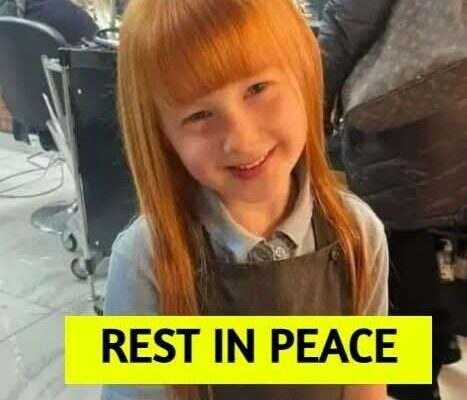Some children light up every room they enter — and five-year-old Lila Marsland was one of those rare souls. Bursting with energy, quick to laugh, and endlessly loved, Lila had just begun school and was still glowing with post-Christmas joy, proudly showing off her brand-new bike. She deserved to be remembered for that joy and innocence.
But instead, Lila’s name became tragically linked to a heartbreak no child should ever know: preventable medical neglect.
On December 27, 2023, during a family walk by the beautiful Dovestone Reservoir in Greater Manchester, a joyful outing took a devastating turn. Lila first complained of a headache. Then, as they headed back to the car, she vomited. By the evening, her condition worsened — she grew lethargic and began experiencing severe neck pain.
Her mother, 36-year-old Rachael Mincherton, a district nurse at Tameside General Hospital, recognized the danger immediately. Taking Lila to the very hospital where she worked, Rachael feared something far graver than a simple virus. She had seen enough to know that a child complaining of neck pain was a serious warning sign — a red flag she could not ignore: meningitis.

Despite being seen by several healthcare professionals—a nurse practitioner, a junior doctor, and a senior pediatric registrar—Lila was sent home from the hospital just after 2:30 a.m., diagnosed with suspected tonsillitis. Her mother, Rachael, trusted their judgment implicitly. After all, she worked alongside them and had always believed in the care they provided.
“I honestly felt reassured,” Rachael told the BBC. “Lila had had infections before, and the care was always excellent. I worked at that hospital. You don’t expect to doubt the people you work with.”
But that trust was shattered in the most unimaginable way the very next morning.
At around 9 a.m. on December 28, Rachael found Lila unresponsive in her bed. Panicked, she called 999 and began performing CPR, desperately trying to save her daughter’s life. Paramedics arrived within minutes—but it was already too late.
“I knew she’d been gone for quite some time,” Rachael said quietly. “The paramedics did everything they could, but there was nothing left to do.”
A post-mortem revealed the heartbreaking truth Rachael had feared all along: Lila had died from pneumococcal meningitis.
The inquest that followed exposed a tragic series of missed opportunities and systemic failures. The jury’s verdict was clear — Lila’s death was preventable, and neglect had played a devastating role.

The jury’s statement was stark and unforgiving:
“Had Lila been admitted to hospital and given broad-spectrum antibiotics within the first hour of being triaged, this would have prevented Lila’s death.”
For 17 long months, Rachael and Lila’s father, Darren Marsland, waited for the truth. When the inquest finally closed, the word they had dreaded was made official — neglect.
“Hearing the word ‘neglect’ is something no parent should ever have to hear,” Rachael said outside the courtroom, her voice heavy with grief, as reported by the Manchester Evening News. “We are now left to live with the devastating loss of our daughter for the rest of our lives.”
Adding to the family’s pain, an apology never came directly to them.
“We’ve never received an apology,” Rachael told the BBC in June 2025. “The first time we heard it was on the news after the inquest.”
The hospital trust issued a general statement acknowledging “missed opportunities” and accepted the coroner’s findings, promising to improve care. But for the Marslands, nothing can undo the damage.
“She was always happy,” Rachael fondly remembered. “She made everyone laugh. Lila was just a special little girl.”
Her 15-year-old sister Ava adored her — the two were inseparable.
“She loved life and was a joy to parent,” Rachael said softly. “She loved school, playing outside with her friends… everything about her was full of light.”
In Lila’s memory, the Marsland family has channeled their grief into something meaningful. They founded Lila’s Light, a nonprofit that provides “bereavement bags” to siblings of children who have passed — small gifts designed to help children express their grief in a world that often overlooks their pain.
To date, they’ve raised over $24,000 to keep Lila’s light shining bright, helping families find hope amidst heartbreak.

“The parents can understand their grief through what the children write and draw,” Darren explained. “Many kids don’t speak out loud, but they pour their feelings onto paper.”
So far, the Marslands have distributed bereavement bags to more than 15 hospitals and raised over $24,000. Darren and his friends even climbed Ben Nevis in Lila’s memory—a testament to their determination to keep her spirit alive.
Yet, beyond raising awareness and demanding change, what they truly want is impossible to replace: their little girl back.
“You’re just sort of surviving,” Rachael confessed. “There are all these ‘what-ifs’ — what if we’d taken her to another hospital? What if we’d done something differently? The questions never stop.”
Lila Marsland should be remembered not for tragedy, but for the joy she brought into the world. She should still be here, laughing with her sister, riding her bike, lighting up every room she entered.
Instead, her name has become a rallying cry—not because she was famous, but because she never should have had to be.
